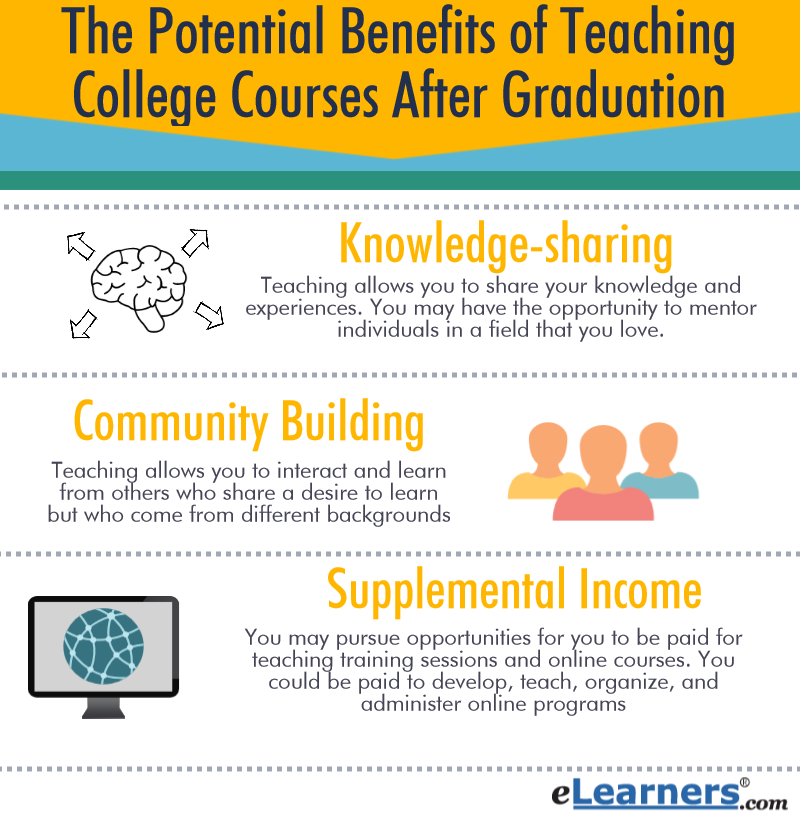After you receive your degree, would you like to teach? Teaching a college course is a great way to share your knowledge, experience and enthusiasm on a topic you studied and enjoy. The rewards of teaching are numerous. Here are just a few benefits of teaching college courses after graduation.

Knowledge sharing:
Teaching will give you an opportunity to share your knowledge and experience. You will have an opportunity to mentor individuals and to inspire enthusiasm in the area of work that you love. What's better than that?
Building Community:
By getting involved in online teaching and training, you'll be helping individuals develop communities of interest and of purpose. This may be the single most satisfying aspect of online education — the chance to interact and learn from others who share a desire to learn, but who come from different walks of life, cultural background, and geographical location.
Post-retirement activity:
You may be in the military or in your job and near retirement. Teaching online can give you a way to share the leadership lessons and insights from years of military and/or civilian occupation.
Lifelong Learning:
Teaching online is a great way to help you encourage individuals to keep moving forward with their education in a way that will open the door to exciting personal, employment and career opportunities.
Respect for Accomplishments:
According to behavioral psychologists, everyone has, at least to some degree, a need for recognition and respect from their peer group. After all, having a place in one's group is a way to survive, and accomplishments bring status, respect, and honor. Undoubtedly you're a modest person, but that still does not negate the fact that you need to let people know what you're about. Respect for your hard-won life battles is very affirming. It also makes you a leader.
Supplemental income:
Don't forget that even though you can volunteer and facilitate pro-bono educational seminars and roundtables, there are also opportunities for you to be paid for teaching training sessions and online courses. The Chronicle of Higher Education periodically runs stories about individuals who are making well into six figures a year by developing, teaching, organizing, and administering online programs (training certification, professional development, and college credit).
Teaching online, any time, any where:
As an online student, you've undoubtedly explore some of the outer reaches of Internet access, from your hotel room, your vacation, your business trip, and even from Iraq or Afghanistan.
One of the best ways to get started is to develop a plan.
- Identify the courses being offered.
- Identify the courses you're qualified to teach.
- Make a list of colleges and universities that offer the course or degree program.
- Find out the way they teach (learning management system, face-to-face approach).
- Become qualified in the learning management system, which may involve taking a series of seminars or obtaining certification.
- Contact the colleges and universities.
- While you wait, donate time and effort to offer free seminars or downloadable instructional material from your blog, Facebook, etc.
Once you've established contacts with online colleges and universities, how do you convince them that you're a good fit?
- Resume: One way is to put together a resume that lists all the ways that you've prepared yourself to be an excellent teacher, both online and face-to-face. You might even include a list of your favorite books and eLearning websites to show that you're keeping up with the field.
- Website: Another way is to put together a website. It does not have to be a formal website, but can be a blog or online portfolio. If you include videos and audio, all the better.
- Certificate Courses: There are a number of inexpensive certificate courses that you can take through institutions that are committed to education and training. They tend to be very cutting-edge in terms of theory as well as practice. In addition to learning how to implement best practices and to address quality issues, one can also become familiar with equipment and software.
Even if you have not yet graduated, it is not too early to start thinking about how you might teach online. Start developing a plan, set achievable and realistic goals, and reward yourself for networking and sharing content. If you have a few setbacks, do not despair. Continue to take a pro-active approach and develop a vision for your particular philosophy of teaching, and a sense of the kinds of outcomes you'd like to achieve by training and teaching online. The future is nothing if not extremely bright in this area. Don't give up. After all, your experience as an online student gives you unique experience, understanding, and empathy.
